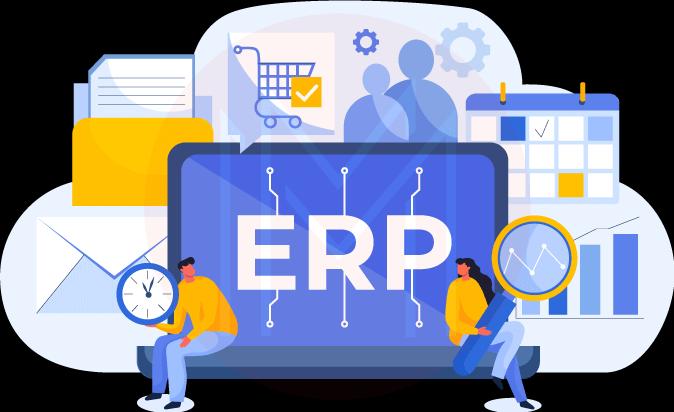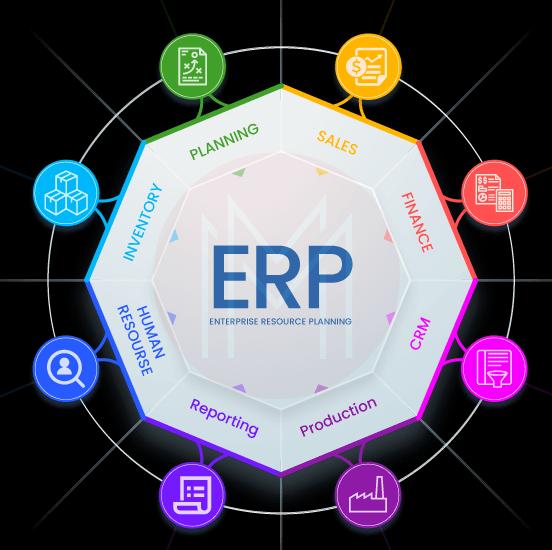Nowadays, ERP has a vital role in every business. It has been reported that above 26% of employees in a company are users of this system. Recent ERP software statistics have shown that 47% of companies using this software are manufacturing companies. The accounting service is the most demanded ERP function. The companies' other functions include inventory and distribution, CRM and sales, and technology. ERP systems have become an important investment and are recommended to be a top priority. In this article, we will be discussing the types of ERP deeply.

| Table of Contents: Types of ERP |
What Is ERP?
ERP stands for enterprise resource planning. It's a tool for managing information which includes organized collection, storage, and use of the information for the day-to-day activities of an enterprise. ERP centralizes all the information and connects all business processes end to end. It is also very helpful for an enterprise to provide better customer service since it gives a single view of the customer. ERP enables the team to work very efficiently because they get all information they need whenever they need it. It simplifies the process of analyzing the business progress and drafting reports.
ERP (enterprise resource planning) is a software application that helps business organizations manage their resources more effectively. It encompasses everything from inventory and procurement to human resources and financial systems. By automating these processes, ERP can help businesses save time and money while increasing efficiency and effectiveness. It can create, maintain, and analyze databases and schedule or control workflows. ERP systems are also often customizable so that they can meet the specific needs of each business.
ERP can be referred to as a variety of software solutions that are used by businesses to manage their operations. These systems typically include modules for inventory management, customer relationship management (CRM), financial accounting and reporting, production scheduling, human resources management (HRM), marketing planning and execution, web design and development, and so on.

| Want to Become a Master in Netsuite? Then visit here to Learn Netsuite Online Training Course! |
Types Of ERP
ERP systems are categorized under three major headings
1. On-premise ERP system
On-premises ERP systems are installed at the company's headquarters and typically include features such as warehouse management, order processing, customer relationship management (CRM), product tracking, and accounting. On-premise ERP systems are a great way to streamline business processes and increase efficiency. By centralizing all your information in one place, you can reduce the time required to perform common tasks. Additionally, on-premise ERP systems often have built-in features that allow for more accurate financial tracking and reporting. This can help managers make better decisions based on real-time data. In addition to these advantages, on-premise ERP systems typically offer greater security than cloud-based solutions due to their centralized location. They also tend to be easier to set up and manage since they require fewer IT resources overall.
2. Cloud-based ERP system
Cloud-based ERP systems allow companies to access these same functionalities anywhere in the world via a web browser or mobile app. A cloud-based ERP system allows businesses to manage their entire business operations from a single, centralized location. This can save time and money because it eliminates the need to carry out different tasks in multiple locations. Additionally, it makes it easier for employees to access information across all areas of the business simultaneously. As a result, cloud-based ERP systems are often preferred by companies that want to increase efficiency and improve communication within their organization.
3. Hybrid ERP
Hybrid ERP is the combined version of on-premise and cloud-based systems. A hybrid ERP provides flexible ERP solutions, a combination of hosting and deployment services, and integrates the existing implementations' benefits. It offers greater control over finances by allowing businesses to automate expenses and generate reports easily interpreted for senior management.
ERP Examples
1. NetSuite
It is a cloud-based ERP software suitable for small and mid-sized businesses. It is an easily customizable and highly scalable solution. By automating key business operations and delivering real-time visibility into operational and financial performance, NetSuite ERP makes it easier for enterprises to run more efficiently.
| Related Article: What is Netsuite |
2. Oracle ERP Cloud
A cloud-based ERP software designed for large-scale businesses is the Oracle ERP Cloud, which small-sized businesses can use. It relies on Oracle, a global network of data centers. Oracle ERP makes it easy to extend any application to the cloud.
3. Acumatica
Acumatica, a cloud-based ERP system, provides real-time monitoring of the financial status of companies. Acumatica ERP makes it easy to connect with suppliers and vendors to conduct transactions smoothly and on time.
4. SYSPRO
It is developed to offer industry-specific functionalities and is a cloud-based ERP software. SYSPRO is an excellent ERP system that provides a complete solution for end-to-end manufacturing.
5. Microsoft Dynamics 365
It is a hybrid ERP solution suited for all businesses of any size. It provides services accordingly to the size of the business and needs by offering different plan packages.
| Related Article: Microsoft Dynamics 365 Tutorial |
How does ERP work?
Over time, classic ERP software models that utilized physical client servers and manual entry systems have replaced cloud-based ERP with remote, web-based access. The platform is typically maintained by the company that built it.
Organizations choose the applications they want to employ. After that, the hosting provider installs the applications on the server the client is renting, and the two parties start integrating the client's operations and data into the platform.
All information is stored on the server, and then made accessible to anyone with access after all departments are joined to the system. The graphs, metrics and other types of visualizations may be utilized in reports to assist a customer.
| Related Article: Components of ERP |
Modern ERP
At certain times, ERP software suites worked independently and didn't interact with one another. Each system needed expensive, intricate, and specialized programming to meet specific business requirements, which slowed the adoption of new technology or process optimization.
The most distinctive feature of the latest ERP software is that it integrates the different processes into a seamless system. It allows data connectivity to your ERP system and productivity software, as well as online shopping platforms, and programs to engage customers. It lets you integrate all your data to provide greater insights that can aid in optimizing your company's processes.
Modern ERP solutions will provide low-code customization, increased security and privacy, flexible deployment options, and sustainability. And most significantly, it promotes continuity.
Conclusion
ERP software is a vital part of any business, and it's been crucial in assisting organizations with everything from streamlining operations to providing better customer service. Future ERP trends include automation of processes, mobility across devices and platforms, artificial intelligence (AI), and cognitive computing. These trends will continue to drive change within the industry, necessitating employees with skills that are adaptable and future-proofed. Organizations must develop a solid strategy and invest in the right technology solutions to stay ahead of changes and enable successful business growth through ERP integration.
 On-Job Support Service
On-Job Support Service
Online Work Support for your on-job roles.

Our work-support plans provide precise options as per your project tasks. Whether you are a newbie or an experienced professional seeking assistance in completing project tasks, we are here with the following plans to meet your custom needs:
- Pay Per Hour
- Pay Per Week
- Monthly
| Name | Dates | |
|---|---|---|
| NetSuite Training | Feb 21 to Mar 08 | View Details |
| NetSuite Training | Feb 24 to Mar 11 | View Details |
| NetSuite Training | Feb 28 to Mar 15 | View Details |
| NetSuite Training | Mar 03 to Mar 18 | View Details |

Madhuri is a Senior Content Creator at MindMajix. She has written about a range of different topics on various technologies, which include, Splunk, Tensorflow, Selenium, and CEH. She spends most of her time researching on technology, and startups. Connect with her via LinkedIn and Twitter .
















